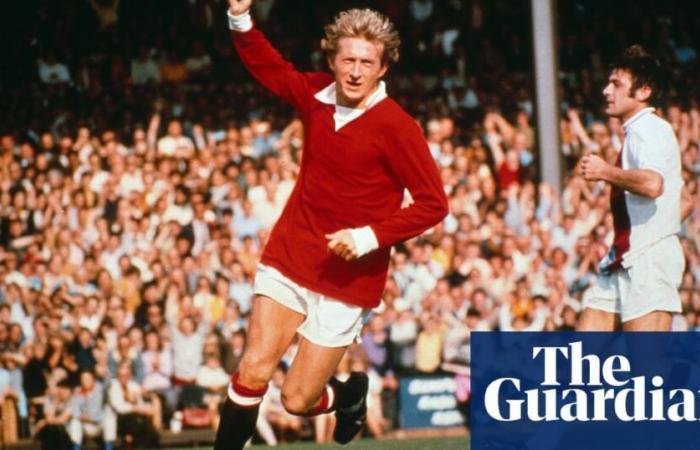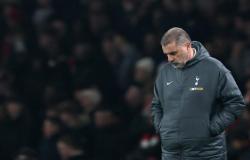
The footballer Denis Law, who has died aged 84, was a Manchester United legend and one of the finest attackers of his, or any other, era. With United in the 1960s he won a European Cup, two First Division titles and an FA Cup, while for his country, Scotland, he racked up 55 caps, scoring 30 goals.
Law had the great player’s ability to do something sudden and unexpected. His ball control was immaculate, his reading of the game exemplary, his passing precise, and his bicycle kicks revealed him as an acrobat. Also possessed of a fiery disposition, he was prepared to give and take hard knocks as the price of his fearless demeanour.
Ebullient, humorous, confident, sometimes intransigent, Law was nicknamed The King by the Old Trafford faithful, and in his first five seasons at Manchester United scored no fewer than 160 times in 222 games. With George Best and Bobby Charlton he formed such a memorable attacking triumvirate that even decades later the very utterance of its surnamed constituents – “Best, Law, Charlton” – immediately conjures up both the excitement and glamour of top-flight English football during that period.
Under Matt Busby, Law won the First Division championship with United in 1964-65, took the European Footballer of the Year award in 1964, and won the championship again in 1966-67, before playing a major part in his team’s passage to the 1968 European Cup final at Wembley, the first ever to be contested by an English team. Sadly, an injured knee in the semi-final kept him out of the side for the final, but United were victorious against Benfica, 4-1.
Law shone for Scotland, too, from the age of 18, when he became one of the youngest debutants for his country, in 1958. A proud Scot, he derived as much pleasure from playing for Scotland as anything he did in football, but the limitations of the Scotland teams in which he played meant he never properly had the chance to strut his great gifts on the finest of all football stages, the World Cup finals. He made just one appearance in the finals, in West Germany against Zaire, at the very end of his footballing days in 1974. One of the highlights of his international career came when he scored four out of his team’s five goals against Northern Ireland at Hampden Park in 1962.
Born one of seven children in Aberdeen, Law, whose father was a fisherman, was a small, blond, fragile schoolboy who wore glasses. Huddersfield Town, rather than his local club, were shrewd enough to spot him, and their manager, Bill Shankly, took him to Leeds Road as a 15-year-old, launching him as a teenager into Second Division football in the 1956-57 season with 13 games, in which he scored two goals.
An inside forward then, as he would remain for much of his career until becoming an out and out striker, he was never a prolific scorer with Huddersfield, bagging just 16 goals in 81 league appearances before, during the 1959-60 season, he moved up a division to Manchester City for a transfer fee of £55,000. By that time his tremendous talents had been plain enough for all to see, not least during an extraordinary performance at West Ham in a 1960 FA Cup tie when he had been an irresistible force in a Huddersfield team that scored five goals at an icy Upton Park.
Manchester City were scarcely the ideal club for so gifted a player; they were a dour, pedestrian team at the time, and Bill Lievers, then their centre-half, was said to have remarked: “We can ruin him, if anybody can.” Nevertheless, by the 1960-61 season Law was fully into his stride at Maine Road, scoring 19 goals in 35 First Division appearances. In the summer, however, City sold him to the Italian club Torino, who were trying to recover from the horrific Superga air crash of 1949 in which their team, in the process of walking away with the club’s fifth consecutive Italian championship, was wiped out. Law was joined at Torino by Joe Baker, the Hibernian centre forward, who was signed at the same time.
-Sharing an apartment in Turin, the pair appreciated being released from British football’s maximum wage restrictions, but quickly became disenchanted with the ultra defensive football in Italy. Even though Law’s form was generally excellent, and he was eulogised by many of the club’s fans, he was homesick for much of the time and decided to leave – along with Baker – after just one season (1961-62), in which he scored 10 goals in 27 league games.
Law’s next move brought him to an ideal haven with Manchester United. There he could truly express himself, supported by players of the quality of Charlton, Pat Crerand and Best. He hit the ground running at Old Trafford, scoring 23 goals in 38 First Division appearances in his first season (1962-63) and helping United beat Leicester City 3-1 in the 1963 FA Cup final, in which he scored a typically spectacular goal, receiving the ball from Crerand and turning in a flash to drive it home.
He scored six goals in that FA Cup campaign, and held the record for the most FA Cup goals – 41 – scored by any player, before it was passed by Ian Rush in 1996. In both of Law’s league-title-winning seasons he was United’s top scorer, but his most prolific league season was 1963-64, when his tally was 30 league goals in as many games. One reason he was able to score so many goals was his tenacious bravery. As a result he was occasionally in disciplinary hot water, and once sat out two month-long suspensions in the space of a year. Often maltreated by opposing defenders, he had nothing of the Prince Myshkin acceptance of Charlton, and was known, in the vernacular, for “getting his retaliation in first”, to the extent that Franco Carraro, president of Milan, noted publicly after a torrid European Cup tie at Old Trafford: “But Denis Law is not a gentleman.”
Once the glory years of the mid-1960s had faded, in 1969 Law had an operation on his knee, and when he came back some of his lightning reflexes had dulled. The new United manager, Tommy Docherty, decided to give him a free transfer across the city to Manchester City, and had every reason to regret the decision. This was underlined when a clever, backheeled goal for City against United from Law at the close of the 1973-74 season helped to defeat his old club on a day when they were relegated to Division Two. Law asked to be substituted immediately and left the field in tears.
He bowed out shortly afterwards at the 1974 World Cup finals with Scotland, disappointed that he had been picked only for the Zaire match and not against Brazil or Yugoslavia in the group stages. On retirement he remained in the Manchester area and was for many years a popular summariser on BBC radio football commentaries. In 2002 a statue of him was unveiled at Old Trafford, followed in 2008 by one of the “united trinity” of Best, Law and Charlton – and in 2004 European football’s governing body, Uefa, named him as Scotland’s most outstanding player of the previous 50 years. He was made CBE in 2016.
Law married Diana in 1962, and they had five children, Diana, Gary, Andrew, Robert and Iain.





